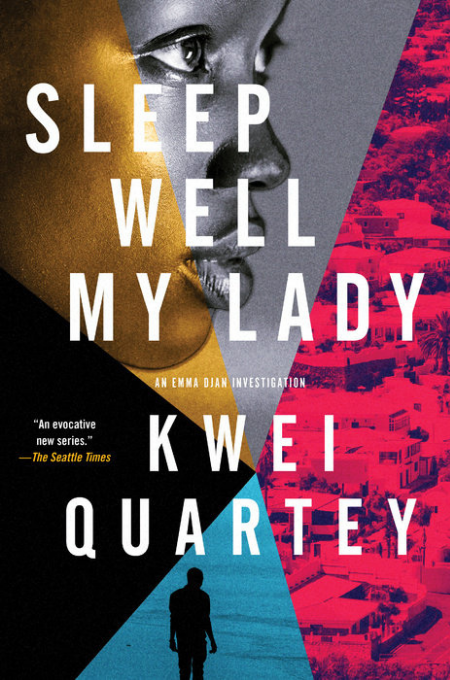
ONE
The day of the murder
In the lavish Trasacco Valley, the Beverly Hills of Accra, no one would have anticipated a murder. The sprawling gated community was landscaped with neat hedgerows and palm trees lining its streets. Pink, yellow, and red hibiscus bushes dotted impossibly green lawns. Red and yellow bougainvillea spilled over the walls and fences.
Completed about a decade before, the Valley couldn’t possibly fit any more buildings. However, east of it along the N1 Highway stretched acres of virgin land where the Trasacco Company had begun constructing several new gated complexes on what would be called Trasacco Hills.
The entrance to the Valley was a ten-foot-high wrought-iron gate with a sentry box where the security guards kept track of who went in and out. Peter, the veteran lead security guard, knew every resident by name and face, but all visitors needed to state their identity and destination, and their license plate number might be noted as well. Peter, forty-five, was older than his peers, some of whom were in their twenties. True, he was a tad overweight and could probably not outrun a fit young intruder, but the Valley’s five-year security record was impeccable, with not a single instance of robbery, burglary, or carjacking. Peter was proud of that.
Change of shift was between 6:30 and 7 a.m., giving Peter another fifteen minutes or so before he went home to his wife and kids. Another early bird in Trasacco Valley was Ismael, the head groundskeeper. With a small number of assistants, he kept hedges trimmed, grass mowed, and weeds cleared. Unlike Peter, he was wiry in build, but like the security man, he was friendly and smiled easily. He had a way with greenery. The elegance of the grounds was, for the most part, due to him. Today, he was to put in Blood of Jesus plants—eye-catching with their deep purple leaves and crimson veins that looked like streaks and splatters of blood—in select areas of the complex.
But before he did that, he had promised Lady Araba Tagoe, who loved decorating her palatial space with flowers and trees, that he would bring her a pair of planters for the upper terrace outside her bedroom.
It was a Monday—a fresh start to the week. Ismael went to the garden shed that stood at the end of Ruby Row next to a motion-sensor exit. From the shed, Ismael removed two large terra-cotta planters and carried them one in each hand to 401 Ruby Row.
For additional security, each mansion in the Valley had a remote-operated wrought-iron gate at the driveway entrance. Among the several different house types and colors, Lady Araba’s was called “The Duke,” painted orange chiffon with a red tile roof trimmed in white. A high-ceilinged portico formed the Duke’s front entrance. As Ismael approached, Lady Araba’s chauffeur, Kweku-Sam, was washing her Range Rover, which he did every morning before he took the boss out. Any driver worth his salt kept his employer’s vehicles shiny and spotless—barely possible in Accra’s dusty environment. Araba’s second car was an Audi, but she preferred the Rover for its high profile and smoothness over rough roads.
“Morning, Kweku!” Ismael called out.
Kweku-Sam looked up from his work and smiled. “Morning. How be?”
“I dey, oo! Wassup?”
They slipped seamlessly into Twi instead of English. Ismael was from arid Northern Ghana, while Kweku-Sam was Akan, but Twi was their lingua franca.
“Where is the house girl?” Ismael asked. “Usually she’s sweeping the yard by now.”
“She traveled to her hometown for a funeral. Where are you taking those flowerpots?”
“To the terrace,” Ismael responded. “Madam asked me to get them for her.” He worked part-time at a plant shop in town.
“Okay,” Kweku said, glancing at his watch. “She will be down in about thirty minutes. Today is a big day for her—the fashion show.”
“Ah, fine.” Ismael knew next to nothing about that kind of thing. It was a different world. The lives of Trasacco’s residents were far removed from his own.
Ismael took a left across the green lawn with sprawling hibiscus, past the projecting bay window of the living room and the kitchen, then a right at the staff quarters to the rear of the house.
On the second floor, Lady Araba’s master bedroom occupied the west wing and opened directly onto a terrace via a framed glass door. Ismael already had a ladder leaning against the wall from the day before when he had been up on the terrace. It was tricky climbing up with a heavy planter in one hand, but he was accustomed to awkward maneuvers. At the top of the ladder, he reached over the decorative terrace wall and set down the first planter gingerly. He returned to the ground and did the same for the second planter before skipping over the wall into the terrace. Ismael loved it here. The shaded pergola, which Lady Araba had designed herself, was surrounded by explosions of color. Hanging ferns, blue plumbago, red ixora, yellow galphimia, and pink desert rose flourished. There wasn’t any other homeowner in Trasacco who could boast of such plant glory. Ismael moved the planters to either side of the pergola. Lady Araba liked symmetry and matching pairs. As Ismael went past, he looked toward the glass door and felt his stomach plunge.
He scrambled down the ladder, jumping the last four rungs to the ground. He ran around to the front of the house, shouting, “Kweku! Kweku!”
Kweku-Sam looked up from polishing off the Rover with a chamois. “What’s wrong?”
“It’s Madam,” Ismael said, breathing hard. “Something bad has happened. Do you have a key to the house?”
Kweku-Sam shook his head. “No. But what has happened?”
“She’s lying in her bed,” Ismael said, “and there’s blood. Take the car and bring Peter here. Quick!”
The Rover’s tires squealed as Kweku-Sam gunned the engine.


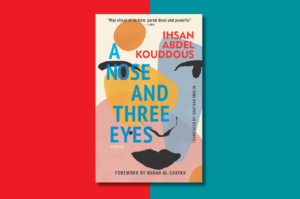

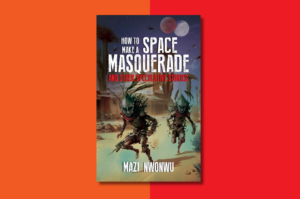
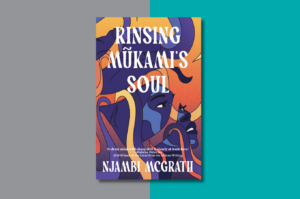
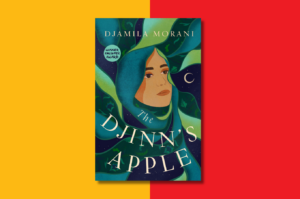


COMMENTS -
Reader Interactions